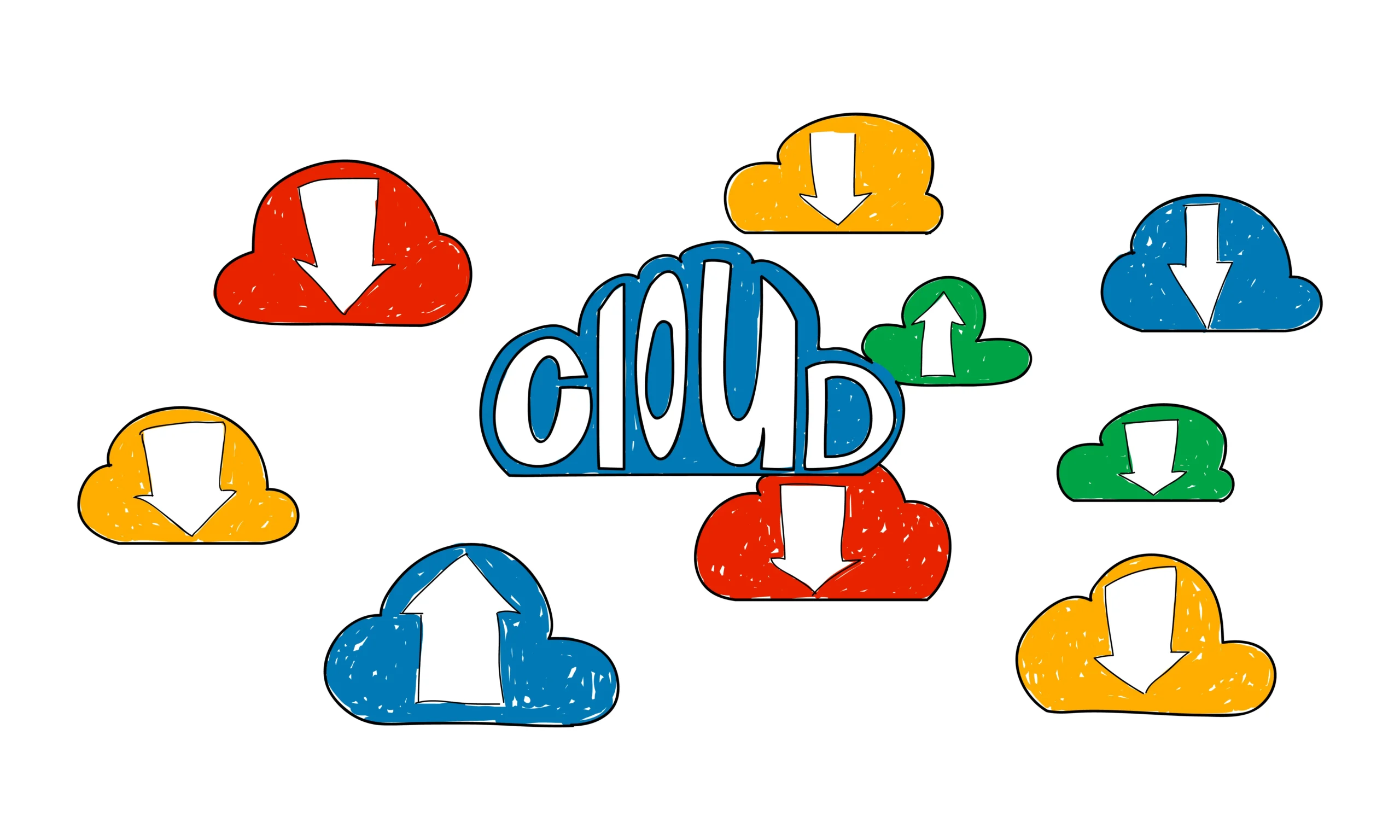10 Easy Advantages Of Moving To The Cloud That Will Shake Your Business!
In this blog post, we will be discussing the many advantages of moving to the cloud that may shock you. The word “cloud” refers to a network of servers connected via the internet and accessible remotely. Many businesses are migrating their infrastructure and apps to the cloud to take advantage of cost savings, scalability, and flexibility.
In this essay, we’ll look at the specific advantages of moving to the Cloud. We will concentrate on the term “advantages of migrating to the cloud” and give ten advantages that may surprise you. Whether you are thinking about shifting to the cloud for the first time or are already utilizing cloud services, this post will provide useful insights into the various advantages the cloud offers.
As you may be aware, the cloud is a network of servers that are linked via the internet and can be accessed remotely. In recent years, an increasing number of enterprises have made the switch to the cloud in order to benefit from cost savings, scalability, and flexibility. In this piece, we’ll look at the term “advantages of migrating to the cloud” and give ten surprising perks that you might not be aware of.

Whether you are thinking about shifting to the cloud for the first time or are already utilizing cloud services, this post will provide useful insights into the various advantages the cloud offers. We will cover a wide range of subjects, such as cost savings, scalability, flexibility, enhanced security, and much more. We hope that at the conclusion of this piece, you will have a better knowledge of the numerous advantages of moving to the Cloud and how they may help your business prosper. So, let’s get this party started!
What are the Advantages Of Moving To The Cloud?
1. Cost Saving
One of the most significant advantages of moving to the Cloud is the potential for huge cost reductions. When you migrate your infrastructure and apps to the cloud, you may frequently decrease or eliminate the requirement for costly hardware and maintenance. Rather than buying and maintaining your own servers, for example, you may rent space on a cloud provider’s servers and pay only for the resources you use. This can result in considerable cost reductions, particularly for enterprises with huge volumes of data or high traffic levels.

Moving to the cloud can result in cheaper energy expenditures in addition to decreased hardware and maintenance expenses. Cloud servers are often situated in data centers that are intended for the energy economy, so using cloud services may save you money on electricity expenditures.
However, these cost reductions are only the beginning. Moving to the cloud may also help firms save money in other ways, such as decreased IT strain, enhanced disaster recovery, and the flexibility to simply switch to new services or technologies as needed. In summary, switching to the cloud can result in huge cost reductions that may surprise you.
2. Scalability
Another advantage of moving to the Cloud is the flexibility to simply scale up and down your infrastructure and resources as needed. It may be difficult and time-consuming to add or remove resources as your organization’s needs change using the traditional on-premises infrastructure. The cloud, on the other hand, allows you to swiftly and easily adapt your resources to suit shifting demands.
This scalability is especially important in times of fast expansion or unanticipated demand. For example, if your website suddenly experiences a spike in traffic, you may quickly scale up your resources to accommodate the additional strain. Similarly, if demand falls, you might reduce your resources in order to save money.

This scalability may help businesses save money in a variety of ways. You can prevent overpaying for resources you don’t utilize by simply paying for what you need when you need it. Furthermore, because you don’t have to invest in pricey gear upfront, you may save money and utilize it for other company purposes.
In summary, the cloud’s scalability may be a significant benefit for firms trying to save money and be more adaptable in the face of changing business demands.
3. Flexibility
Another advantage of moving to the Cloud is enhanced flexibility. With cloud services, you can access your data and apps from any location with an internet connection, removing the need for a single location or device. This is especially handy for firms with remote staff or that require data access from numerous locations.
Moving to the cloud enables greater flexibility in terms of access and deployment, in addition to location flexibility. You may simply give or revoke access to certain individuals or groups, and you can quickly and easily deploy new apps or upgrades. This can help firms respond to shifting business demands and adapt to new difficulties more swiftly.
This adaptability might also result in cost savings. You can save the cost of updating or replacing gear and software by being able to simply switching to new services or technologies as needed. This can help you stay competitive while also saving you money in the long term.

Overall, the freedom that comes with migrating to the cloud may be a significant benefit for firms trying to save money while also being more nimble in the face of changing business demands.
4. Improved security
Contrary to popular belief, shifting to the cloud can really increase organizational security. Some may be surprised, but cloud providers have the resources and experience to build effective security measures that smaller enterprises may not be able to afford.
Cloud companies, for example, frequently have specialized security teams in charge of monitoring and safeguarding data and systems around the clock. They can also put advanced security measures in places, such as encryption, multi-factor authentication, and intrusion detection and prevention systems. These steps can help defend against data breaches and other security disasters, which can be costly to recover from for enterprises.
This greater security can contribute to cost savings in addition to improved security. By lowering the risk of data breaches and other security incidents, you may reduce the costs of recovery and significant reputational harm.

Overall, the increased security that comes with migrating to the cloud may be a significant benefit for businesses trying to save money while protecting sensitive data.
5. Increased collaboration
Cloud services make it easier for teams to communicate and exchange data from any location. This can assist firms in operating more effectively and making better judgments.
Increased cooperation is one of several advantages that firms may expect when they migrate to the cloud. Cloud services make it easy for teams to communicate and exchange data from anywhere with an internet connection. This can assist firms in operating more effectively and making better judgments.
Team members, for example, may view and update documents in real-time from any place using cloud-based file storage and collaboration capabilities. This removes the need for time-consuming and error-prone emailing of documents or the use of USB sticks to distribute data.

Cloud services may assist increase communication and coordination among team members in addition to making it easier for teams to interact. Team members, for example, can use cloud-based project management software to remain up to speed on task status, assign tasks to one another, and offer comments on work in progress. This can assist teams in working more efficiently and avoiding misunderstandings or delays.
Overall, enhanced communication is a significant advantage of migrating to the cloud, and it may assist firms in working more effectively and making better decisions.
6. Improved disaster recovery
In the case of a disaster, the cloud may offer a safe and dependable method of accessing data and systems. This can assist enterprises in recovering faster and with less downtime.
Another advantage that firms may expect when switching to the cloud is improved disaster recovery. The cloud can provide a safe and dependable mechanism to access data and systems in the case of a disaster, such as a natural disaster, power loss, or cyber assault. This can assist enterprises in recovering faster and with less downtime.
Organizations, for example, may access their data from any location with an internet connection using cloud-based data storage. This implies that even if an on-premises data center is not operational, it may still access its data and services over the cloud. This can assist firms in maintaining business continuity and reducing the impact of disasters on their operations.
Cloud services frequently have sophisticated disaster recovery strategies in place, in addition to offering a secure and dependable method to access data and systems. These plans may include steps such as several data centers in different locations, backup systems, and failover methods to guarantee that data and systems are safeguarded in the case of a disaster.

Overall, greater disaster recovery is a significant advantage of moving to the Cloud, and it may help companies recover faster and minimize downtime in the case of calamities.
7. Reduced IT burden
Moving to the cloud can help IT teams minimize their workload by allowing them to focus on more strategic duties rather than maintenance and support.
Another advantage of migrating to the cloud is that it reduces the strain on IT. Organizations may lessen the load on their IT staff by shifting their infrastructure and apps to the cloud, enabling them to focus on more strategic duties rather than maintenance and support.
IT departments, for example, may focus on duties such as enhancing systems, building new apps, and analyzing data rather than managing servers, installing software updates, and troubleshooting difficulties. Because IT teams can devote more time and resources to high-value jobs, firms may become more efficient and inventive.
Moving to the cloud may decrease the load on IT workers by reducing the need for them to spend time on mundane maintenance activities, in addition to allowing IT departments to focus on more strategic responsibilities. This can help firms save money and lessen the risk of IT employee burnout.

Overall, going to the cloud reduces IT strain and can help firms become more efficient and inventive.
8. Greater innovation
Organizations may benefit from new technologies and services more rapidly thanks to the cloud, which helps fuel innovation and growth.
Another advantage that firms may expect when switching to the cloud is increased creativity. Organizations may benefit from new technologies and services more rapidly by utilizing cloud services, which can fuel innovation and growth.
Organizations, for example, may use the cloud to rapidly and easily access and test new technologies without having to invest in expensive gear or software. This can assist firms in remaining cutting-edge and ahead of the competition.

Organizations may utilize the cloud to build and deploy new apps more quickly, in addition to gaining access to new technology. Organizations may create and test new ideas more rapidly and with less risk, if they can scale resources up or down as needed and use tools and platforms on demand.
Overall, higher innovation is a significant advantage of moving to the Cloud, and it may assist firms in remaining cutting-edge and driving development.
9. Improved compliance
Cloud providers frequently enforce strong compliance rules, which can assist enterprises in meeting regulatory obligations and reducing the risk of fines.
Another advantage that firms may expect when switching to the cloud is improved compliance. Cloud providers frequently enforce strong compliance rules, which can assist enterprises in meeting regulatory obligations and reducing the risk of fines.
Many cloud providers, for example, have policies and processes in place to secure sensitive data and guarantee that it is handled in line with applicable legislation. Encryption, access restrictions, auditing, and monitoring are examples of such methods. Organizations may benefit from these compliance procedures and lower the risk of noncompliance by utilizing cloud services.

In addition to assisting enterprises in meeting legal obligations, cloud providers’ compliance procedures may also assist organizations in protecting their own reputation and consumer confidence. Organizations may create confidence with consumers and stakeholders and lessen the risk of reputational harm by demonstrating a commitment to compliance and data security.
Overall, increased compliance is a significant advantage of shifting to the cloud, and it may assist firms in meeting regulatory obligations and protecting their brand.
10. Enhanced customer experiences
Organizations may provide quicker and more dependable services to their clients by utilizing cloud services, which can lead to increased customer satisfaction.
Another advantage that firms may expect when switching to the cloud is improved customer experiences. Organizations may provide quicker and more dependable services to their clients by utilizing cloud services, which can lead to increased customer satisfaction.
Organizations, for example, may use the cloud to scale their resources up or down as needed to meet changing client needs. This can assist them in avoiding downtime and maintaining a constant level of service for their consumers.
The cloud may help firms improve the entire customer experience in addition to offering quicker and more dependable services. Organizations, for example, may give personalized and seamless experiences to their consumers using cloud-based customer relationship management (CRM) systems, which can help develop loyalty and drive growth.

Overall, improved customer experiences are significant advantages of moving to the Cloud, and they may assist firms in improving customer satisfaction and driving growth.
These are just a few more instances of the benefits that businesses may expect when they migrate to the cloud. There are several other benefits to consider, so it is worthwhile to conduct some study and investigate the areas that are most important to your firm.
Conclusion
In this blog post, we’ve highlighted 10 advantages of moving to the cloud that may surprise you.
Cost savings, scalability, flexibility, increased collaboration, improved disaster recovery, less IT strain, more innovation, higher compliance, enhanced customer experiences, and improved security are among the benefits.
Each of these advantages can give considerable benefits to enterprises of all sizes. Organizations may save money, become more nimble and responsive to changing business demands, and secure sensitive data by shifting to the cloud.
If you’re thinking about migrating to the cloud, it’s worthwhile to investigate the benefits it might provide your company. The benefits of going to the cloud are numerous and varied, and it may be just what your firm requires to take the next step ahead.
So, don’t be hesitant to evaluate the advantages of transferring your company to the cloud. It might be precisely what you need to spur innovation and growth.
FAQ
What is cloud computing?
Cloud computing is a method of supplying computer resources through the Internet, such as storage, processing power, and networking. Instead of storing, processing, and managing data on local servers or personal devices, users may access these resources remotely through the cloud. This allows businesses to scale up or down their computing capabilities as needed, pay for just what they use, and access their data and apps from any place with an Internet connection.
Cloud computing services are classified into three types: infrastructure as a service (IaaS), platform as a service (PaaS), and software as a service (SaaS).
IaaS companies give Internet-based access to computer resources such as servers, storage, and networking. Customers can utilize these resources to develop and run their own apps, or as a basis for other cloud services.
PaaS providers provide a platform for developing, deploying, and managing cloud-based applications. The operating system, middleware, and development tools required to create and operate applications are all included.
SaaS companies give online access to software applications. Customers may utilize these applications without having to install or manage them on their own devices.
Cloud computing enables businesses to transfer the maintenance and administration of their computer resources to a third party, allowing them to save money while focusing on their core business. It also enables them to access computer resources on demand, allowing them to scale up and down as needed.
What are the Disadvantages of moving to the cloud?
Moving to the cloud may have the following drawbacks:
Control loss: When you migrate your data and apps to the cloud, you rely on a third-party supplier to store and maintain your data. Some businesses may be concerned about this because they believe they have less control over their data and technology.
While most cloud services have strong security measures in place, there is still a possibility of data breaches or cyber assaults. Before shifting sensitive data to the cloud, it is critical to properly analyze the security procedures of any cloud provider.
Dependence on internet connectivity: To perform correctly, cloud computing requires a stable internet connection. If your internet connection fails, you may be unable to access your cloud data and applications.
While migrating to the cloud might save firms money in the long term, there may be some upfront fees connected with the process. To guarantee that shifting to the cloud makes financial sense for your firm, thoroughly weigh the costs vs the advantages.
Compatibility concerns: Depending on the cloud provider and the apps you use, you may experience compatibility difficulties that must be resolved prior to or during the migration process.
Limited customization: While most cloud providers give a wide variety of options and customization, the extent to which you may configure your cloud environment may be limited. This is an issue for businesses that have special standards or needs.
What are the concerns around cloud computing?
Security: How safe is cloud data storage? Can unauthorized individuals have access to it?
Privacy: What information do cloud providers acquire about their customers, and how do they utilize it?
Interoperability: Can cloud data be accessed and used by many types of devices and software?
How dependable is the cloud in terms of uptime and data availability?
Scalability: Can the cloud readily manage fluctuations in resource demand?
Cost: Is it cheaper to use the cloud or to keep on-premises infrastructure?
Vendor lock-in: Are consumers locked into a certain cloud provider, or can they readily switch?
Control: Do customers have complete control over their data and apps in the cloud or do they have to rely on management tools provided by the provider?
Compliance: Does the cloud fulfill all applicable regulatory standards, such as those pertaining to data security and privacy?
Sustainability: Is the cloud favorable to the environment, or does it have a huge carbon footprint?
Additional Resources
If you want to understand more about the advantages of moving to the Cloud, there are several resources accessible online. Here are a couple such examples:
- Case studies: Many firms have produced case studies outlining their cloud migration experiences and the benefits they’ve seen. These case studies can provide you useful insights into the real-world advantages of moving to the Cloud and help you decide if it’s suitable for your company.
- Research reports: There are several study studies available that investigate the advantages of migrating to the cloud. These papers will help you gain a better knowledge of the benefits of cloud computing and make more educated judgments about whether it is suited for your firm.
- Online articles: There are several articles accessible on the internet that describe the advantages of shifting to the cloud. These articles can provide you a high-level overview of the benefits of cloud computing and help you comprehend the main ones.
Overall, there are several tools available to assist you in learning more about the advantages of moving to the Cloud. By devoting time to investigating these materials, you may gain a better grasp of the benefits that cloud computing can give and assess whether it is appropriate for your firm.







